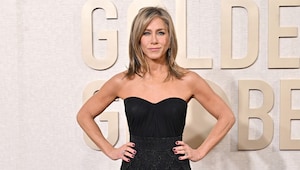'I was diagnosed with high-functioning depression and ADD' - Kusha Kapila
Ambitious and unapologetic, Kusha Kapila has turned her back on her inherent people-pleasing tendencies, turning a blind eye to the remarks from outsiders...in real life and on social media. The centredness she operates with, now, is set to take her to greater heights.

The one thing I have discarded from my life, fairly recently, is the desire to change the opinions of those who disapprove of me. I am an inherent people-pleaser, and I’d credit my need to not control the narrative as part of growing up... Women are often demonised for being successful. I have heard feedback like, ‘Oh, she’s really hungry for success’, or ‘She’s the kind of woman who’ll do anything to get ahead’, which is not the kind of stuff you hear about a successful man. But there’s not much you can do about it. Actor Reese Witherspoon once said in an interview that ‘ambition is not a dirty word’, and I agree with her. Women are constantly conditioned to look and be soft, and so any time we want to be a bit tough, we get attacked.
My first response to negative feedback is to wonder whether something is wrong with me. That’s a very normal feeling to have, especially when you are in the public space. For instance, I got this feedback for my show Comicstaan: that my laugh is weird, and that I talk too aggressively and loudly. So soon after, almost without thinking, I began covering my mouth. I felt like I should laugh softer. But how much feedback can you incorporate? Because the more you are going to ‘behave’ the way in which people approve, the further you’ll move away from who you are. You are almost de-authenticating yourself; you lose yourself in the process. I couldn’t keep up with it in the long run.
There’s no secret to not caring about the opinion of others; it comes with a lot of practice. As a content creator in the public space, one can very easily get caught up in virtual pleasing. And you don’t do it from a place of malice or manipulation. However, it’s more sustainable to live life authentically, as compared to living in the energy of being an ‘awesome’, ‘bad girl’, ‘yass girl’—that can get toxic. You can’t realistically be in that zone 24/7.
During COVID-19, I started seeing a therapist for the first time. I actively began working on myself as a person and recognised my triggers. I was diagnosed with high-functioning depression and ADD. All my life, I have been made to feel bad for being messy and zoning out, even by my peers. But it’s so odd, many women diagnosed my ADD much before I found out, based on my behaviour online. Each time I get such a message now, I don’t find it offensive because it’s almost like a woman looking out for me. This year, many months were messy. But I have come to realise that ADD is a very real situation for me, maybe life-long, and that’s just the way I live. I don’t look at therapy or mental illness as a taboo.
The other day, I was watching myself on a Koffee With Karan episode, and I noticed how I have this need to prove my worth. It’s almost like I am over-compensating so that no one says, ‘She doesn’t deserve to be here’. I don’t think I have learnt to live in silence as yet and be completely secure in myself. However, I am learning to say ‘No’, even though when women say ‘No’, they’re often perceived as being mean, b*tch*s, or cold-hearted.
A hunger for success in women is offensive to people, but I think we need to be more ambitious, harbour less self-doubt, and believe in ourselves a little more. And apologise a little less. Sorry, not sorry.
more from Celebrity

Shanaya's dark romance

Can “friendfluence” save dating?

These five chic haircuts make thin hair look thicker and fuller

Stop posting about your shitty boyfriend (unless you’re gonna dump him)

15 BDSM movies that aren’t just ‘Fifty Shades of Grey’

NAAR and Quintonil: Bringing a taste of Mexico to the Himalayas

The baker boy hat is officially the accessory to own in 2026

15 FaceTime sex positions to level up your virtual connection

The four everyday habits quietly damaging your relationship—and expert tips on how to break them

This Worli café is all about comfort, caffeine, and slow sips


